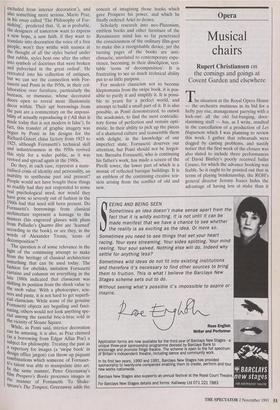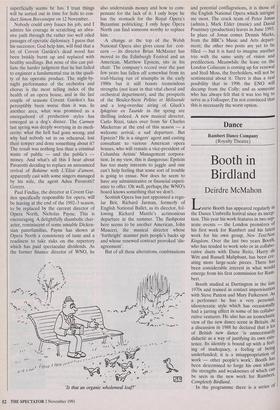Opera
Musical chairs
Rupert Christiansen on the comings and goings at Covent Garden and elsewhere The situation at the Royal Opera House — the orchestra mutinous in its bid for a hefty pay rise, management parrying with a lock-out: all the old fist-banging, door- slamming stuff — has, as I write, resulted in the cancellation of a production of Les Huguenots which I was planning to review this week. I gather that rehearsals were dogged by casting problems, and nastily notice that the first week of the closure was also slated to include three performances of David Bintley's poorly received ballet Cyrano, for which the advance booking was feeble. So it ought to be pointed out that in terms of playing brinkmanship, the ROH's general director Jeremy Isaacs hides the advantage of having less at stake than it superficially seems he has. I trust things will be sorted out in time for Solti to con- duct Simon Boccanegra on 12 November.
Nobody could envy Isaacs his job, and I admire his courage in scratching an abra- sive path through the rather too well oiled passages of operatic diplomacy. I guess that his successor, God help him, will find that a lot of Covent Garden's dead wood has been briskly burnt up and replaced with healthy seedlings. But none of this can pal- liate the harder judgment that he has failed to engineer a fundamental rise in the quali- ty of his operatic product. The night-by- night performance of the orchestra and chorus is the most telling index of the health of an opera house, and in the last couple of seasons Covent Garden's has perceptibly been worse than it was. In another area, what was promised as a smorgasbord of production styles has emerged as a dog's dinner. The Carmen last spring was deeply worrying in its medi- ocrity: what the hell had gone wrong, and why had nobody sat in on rehearsal, lost their temper and done something about it? The result was nothing less than a criminal waste of public — and the public's — money. And what's all this I hear about Pavarotti deciding to replace an announced revival of Boheme with L'Elisir d'amore, apparently cast with some singers managed by his wife, the agent Adua Pavarotti? Grrrrrr.
Paul Findlay, the director at Covent Gar- den specifically responsible for opera, will be leaving at the end of the 1992-3 season, to be replaced by the current director of Opera North, Nicholas Payne. This is encouraging. A delightfully shambolic char- acter, reminiscent of some amiable Dicken- sian paterfamilias, Payne has shown at Opera North a consistency of taste and a readiness to take risks on the repertory which has paid spectacular dividends. As the former finance director of WNO, he also understands money and how to com- pensate for the lack of it. I only hope he has the stomach for the Royal Opera's Byzantine politicking; I only hope Opera North can find someone worthy to replace him.
A change at the top of the Welsh National Opera also gives cause for con- cern — its director Brian McMaster has moved to the Edinburgh Festival and an American, Matthew Epstein, sits in his chair. The company's record over the past few years has fallen off somewhat from its trail-blazing run of triumphs in the early 1980s but it still boasts tremendous strengths (not least in that vital choral and orchestral department), and the prospects of the Boulez-Stein Pefleas et Melisande and a long-overdue airing of Gluck's lphigenie en Tauride in the spring are thrilling indeed. A new musical director, Carlo Rizzi, takes over from Sir Charles Mackerras at the end of this season — a welcome arrival, a sad departure. But Epstein? He is a singers' agent and casting consultant to various American opera houses, who will remain a vice-president of Columbia Artists' Management corpora- tion. In my view, this is dangerous: Epstein has too many interests to juggle and one can't help feeling that some sort of trouble is going to ensue. Nor does he seem to have any administrative or financial experi- ence to offer. Oh well, perhaps, the WNO's board knows something that we don't.
Scottish Opera has just appointed a regu- lar Brit, Richard Jarman, formerly of English National Ballet, as its director, fol- lowing Richard Mantle's acrimonious departure in the summer. The flashpoint here seems to be another American, John Mauceri, the musical director whose `forthright' manner puts people's backs up and whose renewed contract provoked 'dis- agreement'.
But of all these alterations, combinations 'Is that an organic wholemeal loaf?'
and potential conflagrations, it is those of the English National Opera which intrigue me most. The crack team of Peter Jonas (admin.), Mark Elder (music) and David Pountney (production) leaves in June 1993. In place of Jonas comes Dennis Marks, from the BBC's Music and Arts depart- ment; the other two posts are yet to be filled — but it is hard to imagine another trio with the same unity of vision and predilection. Meanwhile the lease on the London Coliseum is coming up for renewal and Stoll Moss, the freeholders, will not be sentimental about it. There is thus a real posibility that in 1996 the ENO will decamp from the Colly; and as someone who has always felt that it was too big to serve as a Volksoper, I'm not convinced that this is necessarily the worst option.



































































 Previous page
Previous page